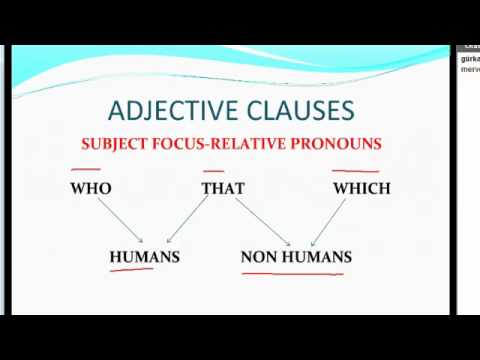 Complex Sentence: Adjective clause คือ อะไร ตอบ ประโยคย่อยทำทำหน้าที่เป็นคุณศัพท์ขยายนาม หรือขยายคำเสมอนามได้เช่นเดียวกันกับ Adjective ธรรมดา แต่การขยายด้วย Adjective Clause จะทำให้ข้อความหนักแน่นยิ่งขึ้น มากกว่าการขยายด้วย Adjective ธรรมดา ในการสื่อสารด้วยภาษาอังกฤษ ผู้ส่งสารได้แก่ผู้พูดหรือผู้เขียนอาจต้องการสื่อสารข้อความที่มีรายละเอียดการอธิบาย หรือขยายคำนามในประโยคโดยไม่อาจใช้เพียงคำหรือกลุ่มคำคุณศัพท์ได้ ในกรณีดังกล่าวส่วนที่ทำหน้าที่เป็นคำคุณศัพท์ขยายคำนามในประโยคอาจอยู่ในรูปของประโยคอีกประโยคหนึ่งคือมีภาคประธานและภาคแสดง จึงมีลักษณะเหมือนประโยคย่อยๆ ที่ซ้อนอยู่ในประโยคหลัก โดยใช้คำนำหน้าประโยคย่อยนี้เพื่อเชื่อมต่อกับประโยคหลัก ประโยคย่อยที่ทำหน้าที่เหมือนคำคุณศัพท์ขยายคำนามในประโยคหลักดังกล่าวเรียกว่าadjective clause ซึ่ง adjective clause นี้มีเรื่องที่นักศึกษาควรรู้ เพื่อให้สามารถสื่อสารด้วยภาษาอังกฤษได้อย่าง มีประสิทธิภาพได้แก่
Complex Sentence: Adjective clause คือ อะไร ตอบ ประโยคย่อยทำทำหน้าที่เป็นคุณศัพท์ขยายนาม หรือขยายคำเสมอนามได้เช่นเดียวกันกับ Adjective ธรรมดา แต่การขยายด้วย Adjective Clause จะทำให้ข้อความหนักแน่นยิ่งขึ้น มากกว่าการขยายด้วย Adjective ธรรมดา ในการสื่อสารด้วยภาษาอังกฤษ ผู้ส่งสารได้แก่ผู้พูดหรือผู้เขียนอาจต้องการสื่อสารข้อความที่มีรายละเอียดการอธิบาย หรือขยายคำนามในประโยคโดยไม่อาจใช้เพียงคำหรือกลุ่มคำคุณศัพท์ได้ ในกรณีดังกล่าวส่วนที่ทำหน้าที่เป็นคำคุณศัพท์ขยายคำนามในประโยคอาจอยู่ในรูปของประโยคอีกประโยคหนึ่งคือมีภาคประธานและภาคแสดง จึงมีลักษณะเหมือนประโยคย่อยๆ ที่ซ้อนอยู่ในประโยคหลัก โดยใช้คำนำหน้าประโยคย่อยนี้เพื่อเชื่อมต่อกับประโยคหลัก ประโยคย่อยที่ทำหน้าที่เหมือนคำคุณศัพท์ขยายคำนามในประโยคหลักดังกล่าวเรียกว่าadjective clause ซึ่ง adjective clause นี้มีเรื่องที่นักศึกษาควรรู้ เพื่อให้สามารถสื่อสารด้วยภาษาอังกฤษได้อย่าง มีประสิทธิภาพได้แก่
1 หน้าที่ของ adjective Clause
adjective clause ทำหน้าที่ขยายคำนามหรือสรรพนามที่มาข้างหน้า โดยอาจใช้ชี้เฉพาะคำนามที่มาข้างหน้าหรือให้ข้อมูลเพิ่มเติมเกี่ยวกับคำนามที่มาข้างหน้า
The snake which is lying near the horse stable has killed the cow.
| จากตัวอย่างจะเห็นได้ว่า which is lying near the horse stable เป็น adjective clause ซึ่งทำหน้าที่ขยายคำนาม the snake ในประโยคหลัก The snake has killed the cow. โดย adjective clause นี้ ชี้เฉพาะ ว่า งูตัวไหนที่ทำให้วัวตาย |
Mrs. Jones, who lives next door , has just donated her blood to the Red Cross.
| จากตัวอย่างจะเห็นได้ว่า who lives next door เป็น adjective clause ซึ่งทำหน้าที่ขยายคำนาม Mrs. Jones ในประโยคหลัก Mrs. Jones has just donated her blood to the Red Cross. โดย adjective clause นี้ ให้ข้อมูลเพิ่มเติม เกี่ยวกับ Mrs. Jones ว่าอาศัยอยู่บ้านหลังถัดไป |
2 คำนำหน้า adjective clause
adjective clause จะมี relative pronoun หรือ relative adverb นำมาข้างหน้า
ดังนั้น adjective clause จึงมีชื่อเรียกอีกอย่างหนึ่งว่า “relative clause”
2.1 คำที่ใช้เชื่อม adjective clause กับคำนามหรือสรรพนามที่มาข้างหน้ามีดังนี้
|
1) |
Relative Pronouns | ||
| who, whom, whose | ใช้แทนคน | ||
| which | ใช้แทนสัตว์และสิ่งของ | ||
| that | ใช้แทนได้ทั้ง คน สัตว์ และสิ่งของ | ||
|
2) |
Relative Adverbs | ||
| where | ใช้แทนสถานที่ | ||
| when | ใช้แทนเวลา | ||
| why | ใช้แทนเหตุผล | ||
ต่อไปนี้จะใช้เครื่องหมาย สีและการขีดเส้นใต้แสดงให้เห็นว่า adjective clause ที่นำหน้าด้วยคำเชื่อมเหล่านี้ทำหน้าที่ขยายคำนามใดในประโยค เช่น
| The snake which is lying near the horse stable has killed the cow. |
แสดงว่า which is lying near the horse stable ( ซึ่งนอนอยู่ใกล้คอกม้า) ขยายคำนาม snake เพื่อระบุว่าเป็นงูตัวใดที่ฆ่าวัว
2.2 การใช้คำนำหน้า adjective clause มีหลักดังนี้
1) Relative Pronouns
who, whom, whose ใช้แทนคำนามข้างหน้าที่เป็นคน
who ใช้เป็นประธานของคำกริยาใน adjective clause
The manager who gives his workers democratic supervision is popular.
The government will give assistance to the garment workers who were laid off .
whom ใช้เป็นกรรมของคำกริยาหรือคำบุพบทใน adjective clause ใช้แทนเหตุผล
A secretary whom the company has just employed graduated from
an open university.
| จากตัวอย่างจะเห็นได้ว่า whom เป็นกรรมของกริยา has just employed ใน adjective clause ซึ่งทำหน้าที่ขยายคำนาม a secretary ในประโยคหลัก A secretary graduated from an open university. ในที่นี้ หมายความว่า เลขานุการ คนที่บริษัทเพิ่งจ้าง จบการศึกษาจากมหาวิทยาลัยเปิด |
The students to whom the teacher gave grade A were very delighted.
| จากตัวอย่างจะเห็นได้ว่า whom เป็นกรรมของบุพบท to ใน adjective clause ซึ่งทำหน้าที่ขยายคำนาม the students ในประโยคหลัก The students were delighted. ในที่นี้ หมายความว่า นักศึกษา พวกที่อาจารย์ให้เกรดเอ ดีใจเป็นอย่างยิ่ง |
whose ใช้แสดงความเป็นเจ้าของระหว่างคำนามที่มาข้างหน้าและคำนามที่อยู่ข้างหลัง whose
The movie director whose son was ordained yesterday is seriously ill.
The 26-year-old woman whose car was not working called for help.
ปกติจะใช้ whose กับคำนามข้างหน้าที่เป็นคน แต่หากใช้อย่างไม่เป็นทางการ ก็สามารถใช้กับ
สัตว์หรือสิ่งของได้ โดยเฉพาะอย่างยิ่งมักใช้กับชื่อประเทศหรือเรือเดินสมุทร
Thailand, whose trade volume has been increasing , has been affected by
the political unrest.
which ใช้แทนคำนามข้างหน้าที่เป็นสัตว์และสิ่งของ โดยทำหน้าที่เป็นประธานหรือกรรมใน
adjective clause
The car which is parked there was stolen from the neighborhood nearby.
The dog which she is raising as a pet was a homeless dog.
that ใช้แทนได้ทั้งคน สัตว์ และสิ่งของ โดยทำหน้าที่เป็นประธานหรือกรรมของคำกริยาใน
adjective clause โดยปกตินิยมใช้ that เมื่อคำนามที่อยู่ข้างหน้ามีคำคุณศัพท์แสดงการเปรียบเทียบ
ขั้นสูงสุดหรือคำคุณศัพท์บอกลำดับที่มาขยายคำนามนั้น
Mr. Williams was the first English speaker that taught our class .
Suda is the most lenient teacher that I have ever seen .
ข้อสังเกต
1. adjective clause ที่นำหน้าด้วย that และ that นั้นทำหน้าที่เป็น object of a preposition
จะต้องไม่ใช้คำบุพบทหน้า that แต่สามารถใช้คำบุพบทตามหลังคำที่ต้องใช้กับคำบุพบทนั้น
ภายใน adjective clause ได้
The book that you are talking about is missing from the library.
2. เมื่อใช้ that นำหน้า adjective clause จะ ไม่ใช้ เครื่องหมาย comma (,) คั่นระหว่าง
adjective clause กับคำนามที่ขยาย
Bob is the athlete that I admire most .
preposition + whom
preposition + which
คำบุพบทสามารถวางไว้หน้า whom และ which ได้หากทั้งสองคำทำหน้าที่
object of a preposition ใน adjective clause
The man in whom I have most trust is my father.
ประโยคตัวอย่างสามารถแยกได้เป็น 2 ประโยคย่อยและนำมารวมกันได้ดังนี้
| a. The man is my father. b. I have most trust in him. |
a. The man is my father. b. I have most trust in him . |
|
The man in whom I have most trust is my father. |
Thailand is in a situation in which it is essential to have unity .
ประโยคตัวอย่างสามารถแยกได้เป็น 2 ประโยคย่อยและนำมารวมกันได้ดังนี้
| a. Thailand is in a situation. b. It is essential to have unity in this situation. |
a. Thailand is in a situation .
b. It is essential to have unity in this situation . |
|
Thailand is in a situation in which it is essential to have unity . |
2) Relative Adverbs
where ใช้แทนคำนามที่บอกสถานที่ ทำหน้าที่เป็นคำกริยาวิเศษณ์ใน adjective clause
( มาจาก preposition + which)
The university where my brother is studying is on the next street.
ประโยคตัวอย่างสามารถแยกได้เป็น 2 ประโยคย่อยและนำมารวมกันได้ดังนี้
| a. The university is on
the next street. at the university. |
a. The university is on the next street.
b. My brother is studying at the university . |
|
The university which my brother is studying at is on the next street. |
The factory where he works is far from the city.
ประโยคตัวอย่างสามารถแยกได้เป็น 2 ประโยคย่อยและนำมารวมกันได้ดังนี้
| a. The factory is far from
the city. |
a. The factory is far from the city.
b. He works at the factory . |
|
The factory which he works at is far from the city.
The factory at which he works is far from the city.
The factory where he works is far from the city. |
when ใช้แทนคำนามที่บอกเวลาซึ่งทำหน้าที่เป็นคำกริยาวิเศษณ์ใน adjective clause
It was in March 2010 when the red-shirted people started their rally .
ประโยคตัวอย่างสามารถแยกได้เป็น 2 ประโยคย่อยและนำมารวมกันได้ดังนี้
| a. It was in March 2010. b. The red-shirted people started their rally in March 2010. |
a. It was in March 2010 .
b. The red-shirted people started their rally in March 2010 . |
|
It was in March 2010 in which the red-shirted people started their rally . |
It’s 5 o’clock when the meeting will begin today .
ประโยคตัวอย่างสามารถแยกเป็น 2 ประโยคย่อยและนำมารวมกันได้ดังนี้
| a. It’s 5 o’clock. b. The meeting will begin at 5 o’clock today. |
a. It’s 5 o’clock .
b. The meeting will begin at 5 o’clock today. |
|
It’s 5 o’clock at which the meeting will begin today .
It’s 5 o’clock when the meeting will begin today . |
why ใช้แทนคำนามที่บอกเหตุผล ทำหน้าที่เป็นคำกริยาวิเศษณ์ใน adjective clause
Give me a reason why you don’t like the Prime Minister .
ประโยคตัวอย่างสามารถแยกเป็น 2 ประโยคย่อยและนำมารวมกันได้ดังนี้
| a. Give me a reason. b. You don’t like the Prime Minister for this reason. |
a. Give me a reason .
b. You don’t like the Prime Minister for this reason . |
|
Give me a reason for which you don’t like the Prime Minister. Give me a reason why you don’t like the Prime Minister . |
I know some reasons why few people have supported him .
ประโยคตัวอย่างสามารถแยกเป็น 2 ประโยคย่อยและนำมารวมกันได้ดังนี้
| a. Few people have
supported him. for this. |
a. Few people have supported him .
b. I know some reasons for this . |
|
I know some reasons for whichfew people have supported him. I know some reasons why few people have supported him . |
3 ประเภทของ adjective Clause
adjective clause แบ่งเป็น 3 ประเภท ได้แก่
3.1 Defining Clause
ใช้ชี้เฉพาะคำนามที่มาข้างหน้า ว่าเป็นคนไหน สิ่งไหน อันไหน ไม่ใช้ เครื่องหมายใด ๆ
คั่นระหว่างคำนามกับ adjective clause ที่ตามมา
A letter which was in a pink envelope was one seeking for a donation to
conserve wildlife.
The group of foreigners who visited our university was from Hawaii.
3.2 Non-defining Clause
ใช้ในการให้ข้อมูลเพิ่มเติมเกี่ยวกับคำนามที่มาข้างหน้า โดยมีเครื่องหมาย comma (,) คั่น
ระหว่างคำนามกับ adjective clause ที่ตามมา
His house, which is on Sukhumvit Road , is a two-storey house.
His wife, who teaches English at NIDA , got a Ph.D. from the USA.
ข้อสังเกต
1. ความแตกต่างของความหมายระหว่าง defining clause และ non-defining clause
จงอ่านประโยคคู่ต่อไปนี้
a. My son who is working at NIDA earned a Ph.D from the USA.
| ประโยค a. สื่อความหมายว่า ฉันมีลูกชายมากกว่าหนึ่งคน และมีอยู่คนหนึ่งที่ทำงานที่ NIDA |
b. My son , who is working at NIDA, earned a Ph.D from the USA.
| ส่วนประโยค b. หมายความว่า ฉันมีลูกชายเพียงคนเดียว และลูกคนนี้ทำงานที่ NIDA |
c. Somsiri, who has long hair , is absent today.
| ส่วนประโยค c. สื่อความหมายว่า มีคนชื่อ สมสิริเพียงคนเดียวในกลุ่มซึ่งทุกคนรู้ว่าเป็นใคร การบอกว่า เธอมีผมยาวเป็นเพียงการให้ข้อมูลเพิ่มเติมเท่านั้น |
d. Somsiri who has long hair is absent today.
| ส่วนประโยค d. มี adjective clause มาชี้เฉพาะคำนามที่มาข้างหน้า ในกรณีนี้สื่อความหมายว่า มีคนชื่อ สมสิริ มากกว่าหนึ่งคนในกลุ่ม แต่คนที่ไม่มาคือ คนผมยาว |
2. การใช้ non-defining clause สามารถใช้ได้กับคำนามทั่วไป (common noun)
ที่ในบริบทได้มีการชี้เฉพาะก่อนหน้าประโยคนี้
Captain Boa is making an announcement to his passengers. The captain , who is 40
years old , graduated from France.
| ประโยคแรกมีการกล่าวถึง Captain Boa ครั้งหนึ่งแล้ว ดังนั้น เมื่อกล่าวถึงกัปตันอีกครั้งในประโยคที่สอง จึงเป็นที่รู้กันว่าเป็นกัปตันคนเดิม adjective clause ที่มาขยาย the captain ในประโยคที่สองจึงเป็นการให้ข้อมูลเพิ่มเติมของกัปตันผู้นี้ ไม่ใช่การชี้เฉพาะว่าเป็นกัปตันคนใด |
3. ห้ามใช้ that ใน non-defining clause
4. ไม่มีการละคำเชื่อมใน non-defining clause
3.3 Sentential Relative Clause
ใช้ในการให้ข้อมูลเพิ่มเติมเกี่ยวกับทั้งข้อความ ไม่ใช่เฉพาะคำนามที่มาข้างหน้า และจะใช้
which นำหน้าเท่านั้นโดยมีเครื่องหมาย comma คั่นจาก main clause ที่มาข้างหน้า
Jane gave him a smile, which surprised him a great deal.
| which surprised him a great deal เป็น adjective clause ขยายความใน main clause คือ Jane gave him a smile. ประโยคนี้หมายความว่า เจนยิ้มให้เขา ซึ่งทำให้เขาแปลกใจมาก |
Jim got more money than other members in the team, which is not fair.
| which is not fair เป็น adjective clause ขยายความใน main clause คือ Jim got more money than other members in the team. ประโยคนี้หมายความว่า จิมได้รับเงินมากกว่าสมาชิกคนอื่นๆ ในทีม ซึ่งไม่ยุติธรรม |
ทั้งนี้ ไม่มี การละคำนำหน้า/คำเชื่อมใน sentential relative clause
4 การละคำนำหน้าใน adjective clause
คำนำหน้า/คำเชื่อม who, whom, which, that ใน adjective clause สามารถละได้ในกรณีต่อไปนี้
4.1 เมื่อทำหน้าที่เป็น direct object ใน defining clause
The dress (which) I like is now on sale.
| which ทำหน้าที่ เป็นกรรมของกริยา like ใน adjective clause ที่มา ขยายคำนาม the dress ใน main clause คือ The dress is now on sale. ประโยคนี้หมายความว่า ชุด(ที่)ฉันชอบตอนนี้อยู่ในช่วงลดราคา |
The person ( that) we admire most is General Pathompong.
| that ทำหน้าที่เป็นกรรมของกริยา admire most ใน adjective clause ที่มาขยายคำนาม the person ใน main clause คือ The person is General Pathompong. ประโยคนี้หมายความว่า บุคคล(ที่)ฉันชื่นชมมากที่สุด คือ พลเอกปฐมพงษ์ |
4.2 เมื่อทำหน้าที่เป็น object of a preposition ใน defining clause
The person with whom I talked about my study problem is a new director of
the school.
| whom ทำหน้าที่ เป็นกรรมของบุพบท with ใน adjective clause ที่มาขยายคำนาม the person ใน main clause คือ The person is a new director of the school. ประโยคนี้หมายความว่า บุคคล(ที่)ฉันคุยเรื่องปัญหาการเรียนด้วย คือ ผู้อำนวยการโรงเรียนคนใหม่ จึงละคำ whom ได้ โดยเมื่อละ whom แล้ว บุพบท with ต้องอยู่ท้าย adjective clause นั้น ดังนี้ |
The person (whom) I talked about my study problem with is a new director of
the school.
5 การลดรูป adjective clause
คำนำหน้า “who”, “which” และ “that” ที่ทำหน้าที่เป็นประธานของ adjective clause สามารถลดรูปเป็นกลุ่มคำต่าง ๆ ได้ โดยเมื่อลดรูปแล้วจะกลายเป็นกลุ่มคำนาม ดังนี้
11.5.1 Appositive Noun Phrase
11.5.2 Prepositional Phrase
11.5.3 Infinitive Phrase
11.5.4 Participial Phrase
5.1 Appositive Noun Phrase
adjective clause ซึ่งมี who, which และ that เป็นประธาน สามารถลดรูปได้
หากหลัง who, which และ that มี BE และให้ตัด BE ออกด้วย เมื่อลดรูปแล้ว จะเป็นกลุ่มคำนาม
ที่เรียกว่า appositive ดังนี้
|
ประโยคที่ใช้ adjective clause |
วิธีการลดรูปเป็น appositive noun phrase |
| Prof. Chakarin, who is my thesis adviser , will retire next year. | Prof. Chakarin, who is my thesis adviser , will retire next year.
Prof. Chakarin, my thesis adviser , will retire next year. |
| His novel, which is entitled Behind the Picture , is very popular. | His novel, which is entitled Behind the Picture , is very popular.
His novel, Behind the Picture , is very popular. |
5.2 Prepositional Phrase
adjective clause ที่มี who, which และ that เป็นประธาน สามารถลดรูปได้ หากหลัง who,
which และ that มีคำกริยาและบุพบท ที่ถ้าตัดคำกริยาแล้วเหลือแต่บุพบท ยังมีความหมายเหมือนเดิม
ให้ตัดคำกริยาออกได้ เมื่อลดรูปแล้ว เป็นกลุ่มคำนามที่เรียกว่า prepositional phrase ดังนี้
|
ประโยคที่ใช้ adjective clause |
วิธีการลดรูปเป็น appositive noun phrase |
| The lady who is dressed in the national costumeis a beauty queen. | The lady who is dressed in the national costumeis a beauty queen.
The lady in the national costume is a beauty queen. ในที่นี้ dressed in the national costume มีความหมายเหมือน in the national costume |
| The football player who came from Brazilreceived a warm welcome from his fans in Thailand. | The football player who came from Brazilreceived a warm welcome from his fans in Thailand.
The football player from Brazil received a warm welcome from his fans in Thailand. ในที่นี้ came from Brazil มีความหมายเหมือน from Brazil |
5.3 Infinitive Phrase
adjective clause ที่มี who, which และ that สามารถลดรูปได้ หากข้างหลังมีกริยาในรูป
BE + infinitive with to เมื่อลดรูปแล้ว เป็นกลุ่มคำนามที่เรียกว่า infinitive phrase ดังนี้
|
ประโยคที่ใช้ adjective clause |
วิธีการลดรูปเป็น appositive noun phrase |
| He is the first person who is to be blamed for the violence yesterday . | He is the first person who is to be blamed for the violence yesterday .
He is the first person to be blamed for the violence yesterday. |
| The researcher did not provide the specific statistics that can be used to test the hypothesis. | The researcher did not provide the specific statistics that can be used to test the hypothesis.
The researcher did not provide the specific statistics used to test the hypothesis .
The researcher did not provide the specific statistics to test the hypothesis . |
5.4 Participial Phrase
1) Present Participial Phrase
adjective clause ซึ่งมี who เป็นประธาน สามารถลดรูปได้ หากหลัง who มีกริยาแท้ ลดรูป
โดยตัด who และเปลี่ยนกริยาหลัง who เป็น present participle (V-ing)
|
ประโยคที่ใช้ adjective clause |
วิธีการลดรูปเป็น appositive noun phrase |
| The school students who visited the national museum were very excited. | The school students who visited the national museum were very excited.
The school students visiting the national museumwere very excited. |
| The two robbers who had escaped to Cambodiawere arrested a week ago. | The two robbers who had escaped to Cambodiawere arrested a week ago.
The two robbers having escaped to Cambodiawere arrested a week ago. |
| The earthquake victims who had been saved by the rescue team were sent to hospital immediately.
|
The earthquake victims who had been saved by the rescue team were sent to hospital immediately.
The earthquake victims having been saved by the rescue team were sent to hospital immediately. |
2) Past Participial Phrase
adjective clause ซึ่งมี which และ who เป็นประธาน สามารถลดรูปได้ หากหลัง which และ
who มีกริยาในรูป passive form (BE + past participle) ลดรูปโดยตัด which/who และ BE ออก
เหลือแต่ past participle ดังนี้
|
ประโยคที่ใช้ adjective clause |
วิธีการลดรูปเป็น appositive noun phrase |
| The money which was lost during the trip was returned to its owner. | The money which was lost during the trip was returned to its owner.
The money lost during the trip was returned to its owner. |
| His father, who was sent by his company to New Zealand , developed lung cancer. | His father , who was sent by his company to New Zealand , developed lung cancer.
His father, sent by his company to New Zealand, developed lung cancer. |
อย่างไรก็ตาม ทั้ง present participial phrase และ past participial phrase สามารถ
ขยายนามโดยนำมาวางไว้หน้าคำนามได้ ดังนี้
Thailand is a country which exports rice .
Thailand is a rice-exporting country.
Passengers have to wait for trains which come late .
Passengers have to wait for late-coming trains.
This blouse which was made by hand is very expensive.
This hand-made blouse is very expensive.
The chairs which were slightly damaged were sent for repair.
The slightly damage chairs were sent for repair.
















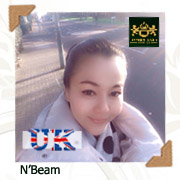





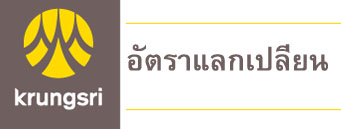












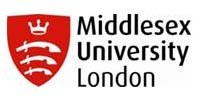











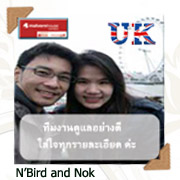
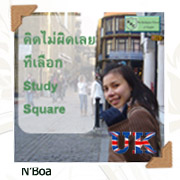



















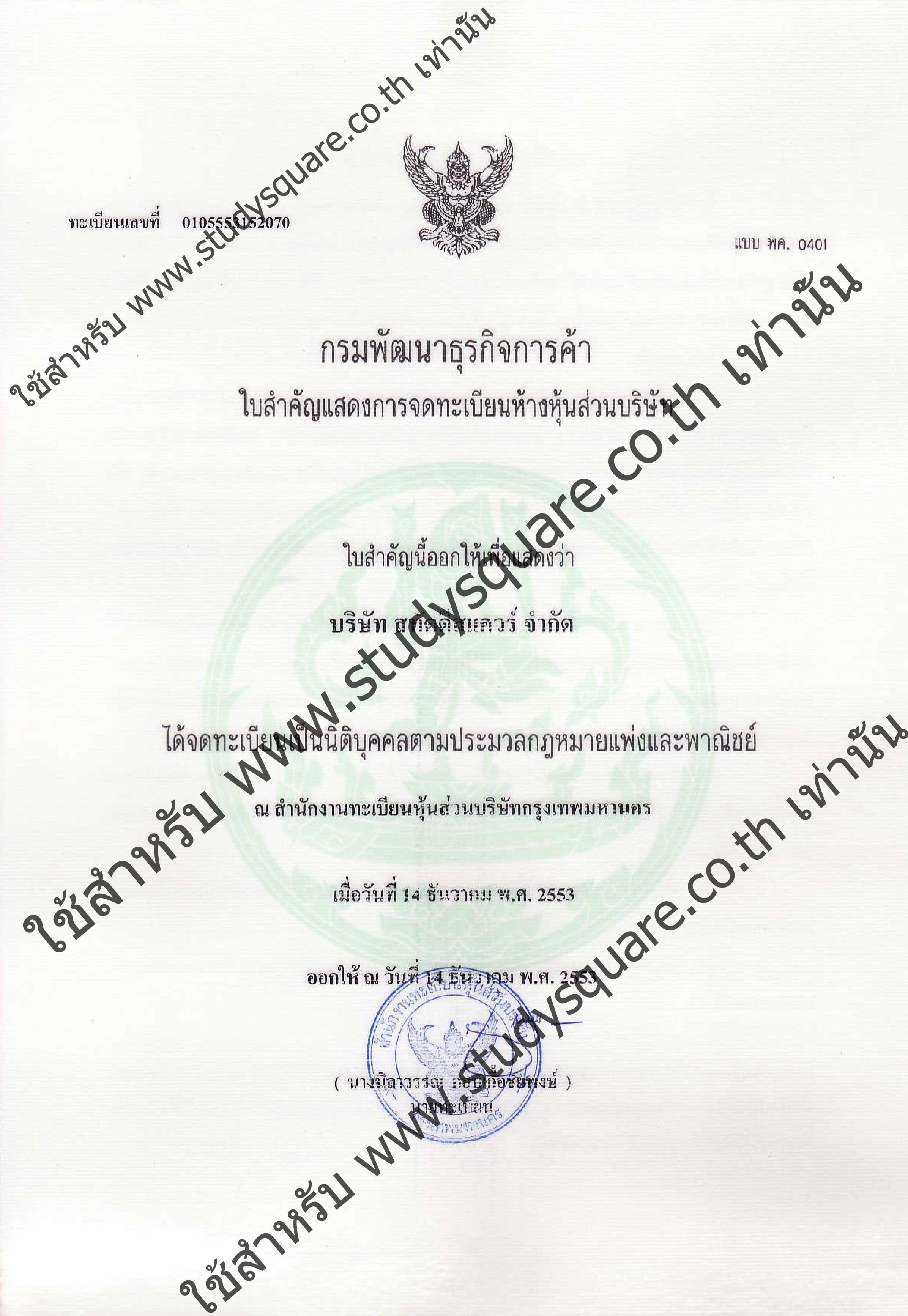

















ขอบคุณที่ช่วยแนะแนวความรู้ให้นะคะ 🙂